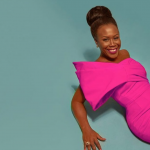Model Chrissy Teigen is on the cover of Glamour Magazine‘s April 2017 issue and she’s opening up for the first time about suffering from Postpartum Depression following the birth of her and John Legend‘s baby girl, Luna last year.
In a no-holds-barred essay for the magazine, the bubbly 31-year-old detailed her struggle with PPD and how she’s dealing with it.
See excerpts and pictures from the cover shoot below.
On landing the Glamour cover: When Glamour first told me I was going to be on the cover, I was freaking thrilled. Seriously. As a longtime reader, I couldn’t believe it. I’d always assumed that wearing swimsuits (or half a swimsuit) or having the occasional nip slip (or bit slip) wouldn’t make me the go-to choice for a women’s magazine I not only love but respect.
Yet here I am! Next they asked me to write an essay. I was super into it, but then cringed every time I opened my laptop. Topics? I quickly realized I have truly talked about everything possible. I guess that’s the dilemma one faces when they…well…can’t shut up. I’ve been a chronic oversharer since birth. So I decided I’d talk about something no one really knows about me, mainly because I just learned about it myself. What is it? I’ll get there.
On her husband, John: Let me start here: To a lot of you, I think, I seem like the happiest person on the planet. I have an incredible husband—John and I have been together for over 10 years. He has seen my successes and failures; I’ve seen his. He has seen me at my worst, but I will say I don’t think I have ever seen him at his. He’s exactly as compassionate, patient, loving, and understanding as he seems. And I hate it. OK, I don’t hate it. But it can certainly drive you nuts sometimes when you’re as cynical as I am. If I weren’t me, I would politely excuse myself to make the most epic eye roll of all time if a woman talked to me about her significant other the way I just did to you.
On having Luna and finding herself unhappy: And a year ago, in April, John and I started our family together. We had our daughter, Luna, who is perfect. She is somehow exactly me, exactly John, and exactly herself. I adore her.
I had everything I needed to be happy. And yet, for much of the last year, I felt unhappy. What basically everyone around me—but me—knew up until December was this: I have postpartum depression. How can I feel this way when everything is so great? I’ve had a hard time coming to terms with that, and I hesitated to even talk about this, as everything becomes such a “thing.” During pregnancy, what I thought were casual comments about IVF turned into headlines about me choosing the sex of my daughter. And I can already envision what will be said about me after this admission. But it’s such a major part of my life and so, so many other women’s lives. It would feel wrong to write anything else. So here goes.
I had such a wonderful, energetic pregnancy. Luna sat inside me like a little cross-legged Buddha facing toward my back for nine months. I never saw her face in a sonogram, just her butt or the back of her feet. Every time we kinnnnd of saw a nose, she would quickly dodge, and I was left guessing again. John, my mom, and my sister were all in the delivery room. John was DJ-ing. Luna, fittingly, popped out to the song “Superfly.” The first lyric is “Darkest of night. With the moon shining bright.” I immediately put her on my chest. And she had a face! I was so happy. And exhausted.
On not knowing the cause of her unhappiness: I couldn’t figure out why I was so unhappy. I blamed it on being tired and possibly growing out of the role: “Maybe I’m just not a goofy person anymore. Maybe I’m just supposed to be a mom.”
When I wasn’t in the studio, I never left the house. I mean, never. Not even a tiptoe outside. I’d ask people who came inside why they were wet. Was it raining? How would I know—I had every shade closed. Most days were spent on the exact same spot on the couch and rarely would I muster up the energy to make it upstairs for bed. John would sleep on the couch with me, sometimes four nights in a row. I started keeping robes and comfy clothes in the pantry so I wouldn’t have to go upstairs when John went to work. There was a lot of spontaneous crying.
Anytime I was seen out, it was because I had already had work or a work event that day. Meaning I wouldn’t have to muster up the energy to take a shower, because it was already done. It became the same story every day: Unless I had work, John knew there was not a chance in hell we were going on a date, going to the store, going anywhere. I didn’t have the energy.
Before, when I entered a room I had a presence: head high, shoulders back, big smile. Suddenly I had become this person whose shoulders would cower underneath her chin. I would keep my hands on my belly and try to make myself as small as possible.
On being diagnosed with PPD: Before the holidays I went to my GP for a physical. John sat next to me. I looked at my doctor, and my eyes welled up because I was so tired of being in pain. Of sleeping on the couch. Of waking up throughout the night. Of throwing up. Of taking things out on the wrong people. Of not enjoying life. Of not seeing my friends. Of not having the energy to take my baby for a stroll. My doctor pulled out a book and started listing symptoms. And I was like, “Yep, yep, yep.” I got my diagnosis: postpartum depression and anxiety. (The anxiety explains some of my physical symptoms.)
On having a misconception of PPD prior to her diagnosis: Before this, I had never, ever—in my whole entire life—had one person say to me: “I have postpartum depression.” Growing up in the nineties, I associated postpartum depression with Susan Smith [a woman now serving life in prison for killing her two sons; her lawyer argued that she suffered from a long history of depression], with people who didn’t like their babies or felt like they had to harm their children. I didn’t have anything remotely close to those feelings. I looked at Luna every day, amazed by her. So I didn’t think I had it.
I also just didn’t think it could happen to me. I have a great life. I have all the help I could need: John, my mother (who lives with us), a nanny. But postpartum does not discriminate. I couldn’t control it. And that’s part of the reason it took me so long to speak up: I felt selfish, icky, and weird saying aloud that I’m struggling. Sometimes I still do.
On John being very helpful and their plans for more babies: I’m grateful for the people around me. John has been incredible over the last nine months, bringing me my medicine and watching horrible reality TV with me. He is not the goofiest guy, but he has gone out of his way to indulge my sense of humor. When I was having a good day, he would go to Medieval Times with me and put on the crazy period hat! He sees how much my eyes light up when he does that stuff, and he knows that’s what I need. I know he must look over at times and think: My God, get it together. But he has never made me feel that way. He wants me to be happy, silly, and energetic again, but he’s not making me feel bad when I’m not in that place. I love John and Luna more than I can imagine loving anything, and John and I still hope to give Luna a few siblings. Postpartum hasn’t changed that.
Read the full essay here.







Comments
Loading…